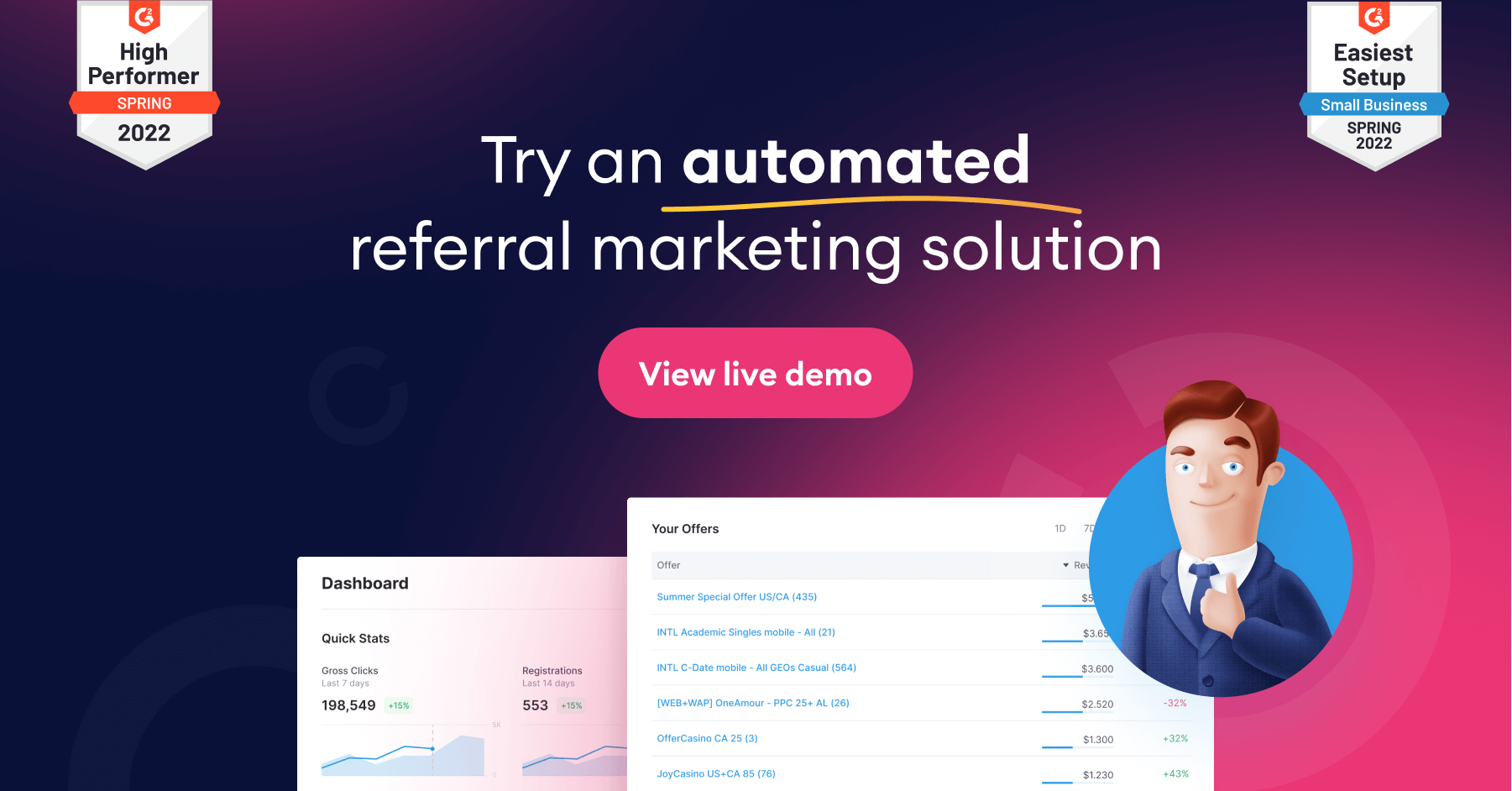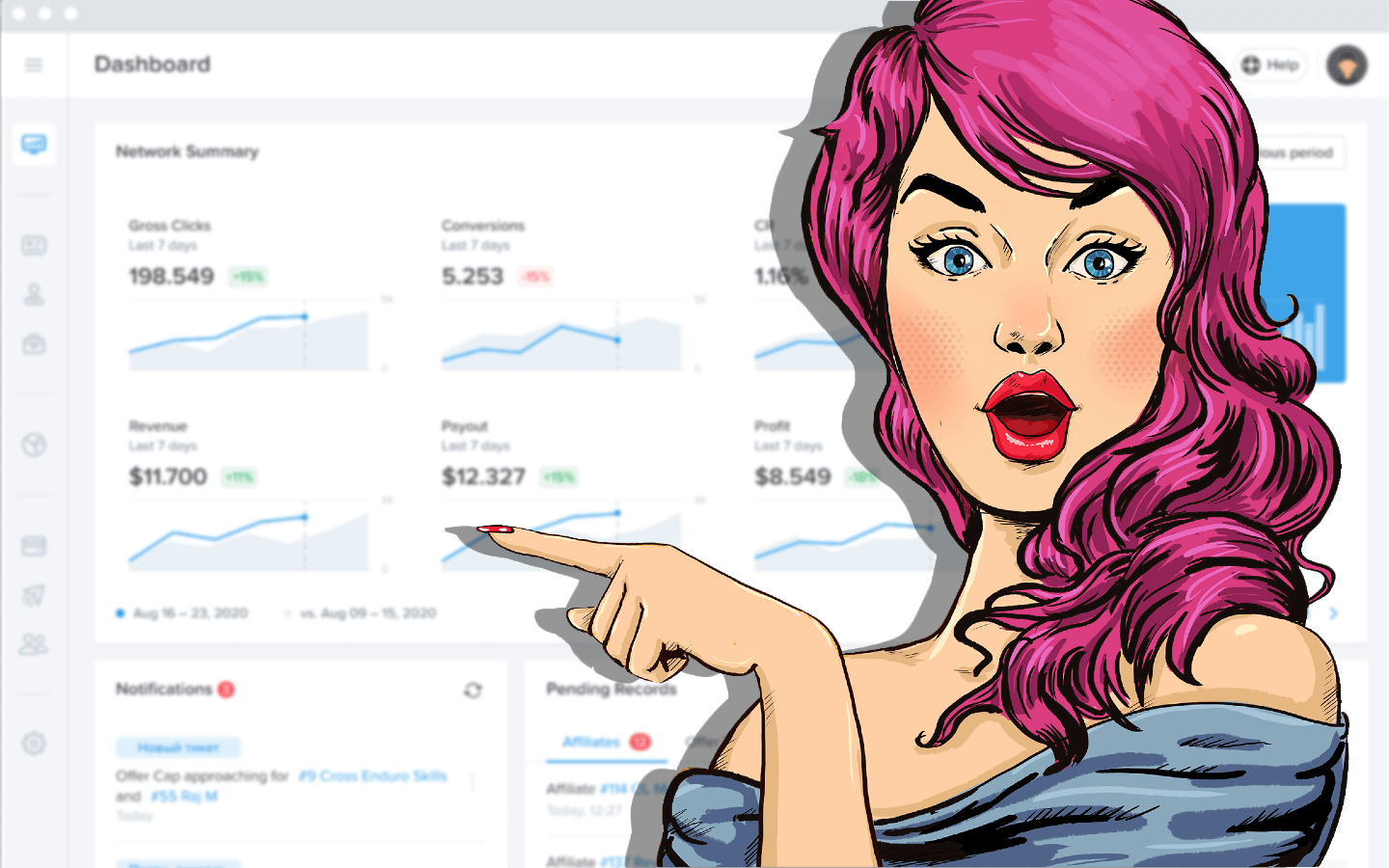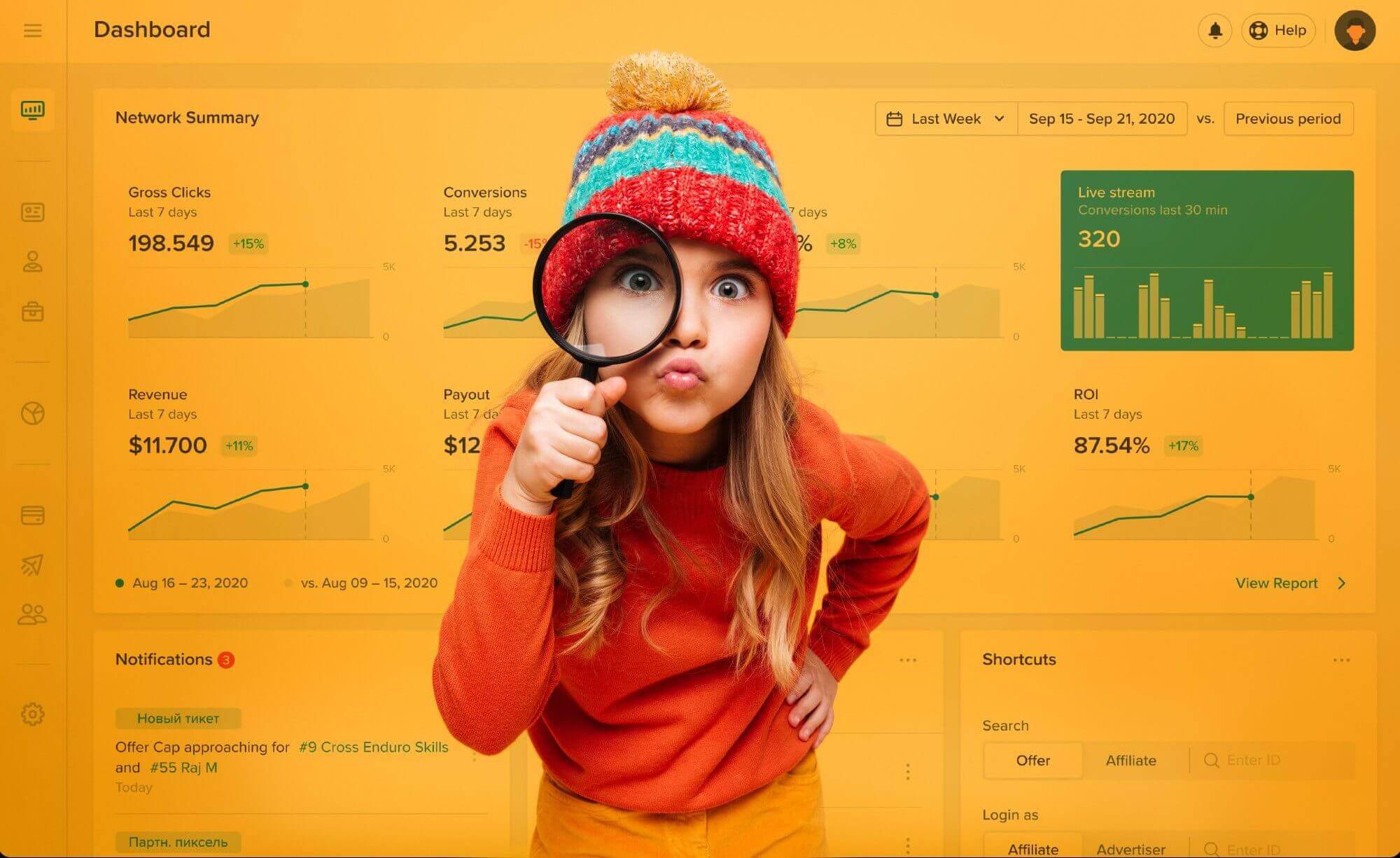Starting a B2B referral program can boost your business in ways you might not have imagined. Successful companies use this powerful strategy to expand their reach and increase sales. With the right approach, it’s easier than you think. You’ll learn how to start and use a referral program effectively, creating a strong network of business partnerships.
You’ll discover how to motivate your partners to bring in new clients and how to reward them for their efforts.
This post provides all the tools needed to make your B2B referral program a roaring success.
Ready to get started?

What is a B2B Referral Program?
A B2B referral program is a structured marketing strategy that allows businesses to gain control over the sharing process. By providing a platform for satisfied customers to refer their peers, B2B referral programs make it easier for businesses to share their products or services with others.
These programs automatically track the referrals made by clients and reward them whenever their recommendations lead to a sale.
Why Referral Marketing Matters for B2B Companies
Referral marketing is crucial for B2B companies.
Why?
Because referrals convert like crazy!
Studies show referral leads have a 70% higher conversion rate than leads from other sources.
Build Trust and Credibility
Happy customer referrals build trust and credibility, which are crucial, particularly in B2B transactions that are typically larger and more long-term. When you receive a recommendation from someone in your industry or target audience, it demonstrates to potential customers that you have a proven history of achieving success.
Reduce Churn
Referral programs also help reduce churn since customers who refer your business are unlikely to leave. According to the Wharton School of Business, referred customers have a 16% higher lifetime value. They tend to be very loyal, long-term customers.
Targeted Reach
Referrals allow you to reach new prospects who are a great fit. Your current customers will only refer others who they think will benefit from your product or service. This targeted reach helps ensure the leads you get are high-quality.
Cost-Effective
While referral marketing requires an investment in a well-designed program, it is extremely cost-effective versus lead generation methods like pay-per-click ads or trade shows. The only major costs are the incentives you offer for referrals.
Referral marketing should be a key part of your B2B marketing strategy. When harnessed properly, it leads to higher conversions, lower churn, a more targeted reach, and major cost savings. What’s not to love? Build your referral program today and start reaping the benefits.
Benefits of Implementing a B2B Referral Program

- Increased Trust and Credibility: In the B2B space, trusted recommendations carry significant weight. By implementing a B2B referral program, businesses can leverage the trust and credibility of their satisfied customers to attract and convert new clients. When decision-makers receive referrals from trusted sources, they are more likely to consider the recommended brand.
- High-Quality Leads: B2B customer referral programs have been proven to generate high-quality leads. According to Forbes, 78% of B2B marketers believe that B2B referral programs are a source of high-quality leads. This means that referred prospects are more likely to convert into paying customers, resulting in a higher return on investment for businesses.
- Cost-Effectiveness: B2B referral programs can be a cost-effective marketing channel. Research above from Forbes also has shown that 54% of marketers believe that B2B referral programs bring in leads at a lower cost than other marketing channels. By leveraging the power of word-of-mouth marketing, businesses can tap into a cost-effective source of new leads and customers.
- Personalized Experience: B2B purchases involve a multistep sales journey and a long decision-making process with multiple stakeholders. Unlike B2C transactions, B2B deals are usually long-term and require a highly personalized approach. By receiving referrals through a B2B referral program, businesses can provide potential clients with the specific information and support they need to make informed purchasing decisions.
How to Get Buy-in for a Referral Program
To launch a successful B2B referral program, it is important to get the support of your entire company. Here are some tips to help you achieve this:
Have a clear vision and communicate it
Explain how a referral program can benefit both your company and your employees. For example, it can drive new business, increase customer loyalty, and boost employee morale and compensation. Share specifics to help them understand the potential impact.
Get leadership support first
Their backing is essential, so present a well-thought-out plan to executives and managers. Discuss how the program aligns with company goals and priorities. With their support secured, it will be much easier to motivate others.
Train and educate teams
Conduct information sessions to teach teams about the program, how it works, and their role in it. Answer any questions to ensure they fully grasp the benefits and process. Their enthusiasm and participation will determine the program’s success, so make them feel invested in it.
Offer incentives and rewards
People are more likely to buy in if they stand to gain from it. Consider providing compensation, commissions, or other perks for making valuable referrals. Make rewards even more appealing by tying them to team or company performance.
Launch a pilot first
Run a trial program with a few teams or business units before a full rollout. Work out any kinks, get feedback, and make improvements. Teams participating in the pilot will become advocates to help convince others, and starting small allows you to prove success before going company-wide.
With the right approach, you can motivate your entire organization to get behind a referral program. By communicating the vision, securing leadership support, educating teams, offering incentives, and running a pilot, you’ll gain the buy-in you need to make your program thrive.
Planning Your B2B Referral Program

Define Your Target Audience
Before starting your B2B referral program, defining your target audience is crucial. Knowing exactly who you want to reach will help you tailor your program to their needs and preferences. Take the time to identify the characteristics of your ideal customers and partners. Consider factors such as industry, company size, location, and purchasing behavior.
Knowing your target audience helps you create messages that connect with them. By addressing their problems and objectives, you can increase the likelihood of attracting valuable recommendations. Identifying your target audience also helps you choose the right channels and strategies to encourage referrals.
Set Clear Goals and Objectives
Setting clear goals and objectives for your B2B referral program is essential for measuring its success. Ask yourself what you hope to achieve with this program. Are you aiming to increase sales, generate more leads, or improve customer loyalty? Specific goals will guide your decision-making process and help you track your progress.
Once you’ve established your goals, break them down into measurable objectives. For example, if your goal is to increase sales, you might set an objective to acquire a certain number of new customers through referrals within a specific timeframe. Setting clear and measurable objectives, allows you to evaluate to evaluate the effectiveness of your program and make adjustments if needed.
Determine Incentives and Rewards
Offering attractive incentives and rewards is important to encourage participation in your B2B referral program. Consider what would motivate your customers and partners to refer others to your business. Monetary rewards, such as discounts, commissions, or cash bonuses, are commonly used in B2B referral programs.
In addition to financial incentives, you can also offer non-monetary rewards.
These could include exclusive access to resources or events, recognition in your company’s newsletter or website, or personalized thank-you gifts. The key is to provide incentives that align with the preferences and needs of your target audience.
Remember, the incentives and rewards you choose should be appealing enough to encourage participation but also sustainable for your business. Strike a balance between providing value to your referrers and maintaining profitability.
Designing for the B2B Purchasing Process
When creating a B2B referral program, it’s crucial to take into account the unique requirements of the B2B purchasing process. Unlike B2C transactions, B2B purchases usually take longer and involve multiple decision-makers.
To accommodate these needs, businesses should customize their referral program. This can be done by setting clear goals, providing appropriate incentives, targeting the right audience, and creating a simple referral process. By doing so, businesses can successfully attract new customers and increase sales.
Crafting an Attractive B2B Referral Offer
A good referral program needs an attractive offer to motivate customers and partners to refer new businesses. Here are some tips for creating a compelling B2B referral offer:
Provide meaningful rewards
For B2B referrals, cash, gift cards, and product credits probably won’t motivate referral behavior. Instead, offer rewards that provide value to the referring business like:
- Co-marketing opportunities: Offer to promote their business to your audience or work together on a campaign.
- Access to resources: Give them free access to tools, data, or other resources to help their business.
- Event tickets: Provide tickets to an industry conference or networking event.
Make rewards scalable
As referrals come in, you want to be able to increase the reward to match the value of the referral.
For example, offer a tiered reward system where the reward gets bigger as more referrals are made, or key referral milestones are reached. This will keep your referring partners motivated to continue promoting your business.
Track referral progress
Have a system in place to track referrals and the rewards earned. Send regular updates to your referral partners about how many referrals they’ve made, the value of those referrals, and any rewards they’ve earned or are close to earning.
This transparent communication will keep them engaged with the program.
Recognize and show appreciation
Simply providing rewards is not enough. Publicly recognize and thank your top referring partners. Send a handwritten thank you card or a small token of appreciation.
Mention them on social media or in your email newsletter. Your gratitude and recognition can be a powerful motivator, even more so than the rewards themselves.
A well-designed referral offer and a user-friendly way for partners to refer new clients is the foundation for a successful B2B referral marketing program. With the right mix of meaningful rewards, scalability, communication, and recognition, you’ll have happy partners referring high-quality leads.
Promoting & Tracking Your B2B Referral Program
Promoting your B2B referral program is key to gaining traction and new referrals. Here are some tips to get the word out:
1 – Email Campaigns
Send emails to announce the launch of your referral program. Explain how it works and the benefits, and call the recipient to action to sign up and start referring. Be sure to include social sharing buttons to spread the word on LinkedIn, Twitter, and Facebook.
2 – Websites
Prominently feature your referral program on your website. Include full details on the homepage and a dedicated page explaining the program. This makes it easy for visitors to learn about the benefits and how they can join.
3 – Blog Posts
Write blog posts talking about your new referral program. Share why you started the program, how it works, success stories, and a call to action for people to sign up. Optimize these posts for search so people can discover them organically.
4 – Sales Team
Educate your sales team about the referral program so they can promote it to new and existing clients. Provide them with collateral like emails, flyers, and talking points to make it easy for them to spread the word. Their direct outreach and relationships can be very impactful.
To track the success of your promotional efforts, closely monitor key metrics like:
• Referral sign-ups – The number of people who sign up to be a part of the program. Aim for a steady increase over time.
• New referrals – The number of new referrals generated from the program. Again, you want to see this number rise over weeks and months.
• Conversions from referrals – The percentage of referrals that actually turn into new clients or sales. Track this to ensure your referral program remains mutually beneficial.
• Traffic and engagement from promotional channels – See which channels like email, social, and your website are driving the most interest and participation in your referral program. Then double down your efforts on the most effective channels.
Continually optimizing your referral program promotion and tracking the right metrics is key to building a successful B2B referral program. Pay attention to what’s working and make changes to improve results over time.
Building a Strong Referral Network
Referral marketing is a powerful tool for B2B businesses. When B2B decision-makers receive a recommendation from someone they trust, they are more likely to take it seriously.
That’s why building a strong referral network is essential for the success of your B2B referral program. This section will discuss three key steps to help you establish a robust network of referral partners.
Identify Potential Referral Partners
First, you need to identify potential referral partners who can help you reach your target audience. Start by considering individuals or businesses closely aligned with your industry or offering complementary products or services. These partners should have a solid reputation and a network of contacts that align with your target market.
For example, if you are a software company specializing in project management tools, you may consider partnering with a consulting firm that offers project management services. Their clients could benefit from your software, and they can vouch for the effectiveness of your product.
When identifying potential referral partners, consider who already has a relationship with your target audience. Look for industry influencers, thought leaders, and respected organizations that can lend credibility to your brand.
Establish Trust and Relationships
Once you have identified potential referral partners, it’s crucial to establish trust and build strong relationships with them. Remember, referral partners, are putting their reputation on the line when they recommend your business.
Therefore, it’s essential to demonstrate your expertise, reliability, and commitment to delivering value to their network.
Here are a few strategies to help you establish trust and build relationships with your referral partners:
- Offer value: Provide resources, insights, or exclusive content to benefit your partners and their network. This demonstrates your willingness to contribute and helps solidify your position as a trusted collaborator.
- Communicate regularly: Keep the lines of communication open with your referral partners. Regularly update them on new products, promotions, or any other relevant information that can help them refer your business more effectively.
- Provide exceptional customer service: When a referral partner sends a lead your way, ensure an exceptional customer experience. This will impress the referred customer and reinforce your referral partner’s trust in your business.
Investing time and effort into building strong relationships with your referral partners increases the likelihood of receiving high-quality referrals and fostering long-term collaborations.
Provide Training and Resources
To ensure your referral partners are equipped to promote your business effectively, providing them with the necessary training and resources is essential. This includes educating them about your products/services, target audience, and key selling points.
Consider hosting training sessions or webinars to educate your referral partners on positioning your offerings and answering common questions or objections. Provide them with marketing collateral, such as brochures, case studies, or videos, that they can easily share with their network.
Additionally, consider creating a referral program portal or dashboard where your partners can access all the needed resources, track their referred leads, and view their rewards or incentives.
Providing comprehensive training and resources allows you empower your referral partners to confidently promote your business, resulting in more effective referrals and increased success for your B2B referral program.
Remember, building a strong referral network takes time and effort.
However, by identifying potential referral partners, establishing trust and relationships, and providing training and resources, you can create a network of advocates who will help drive the success of your B2B referral program.
Optimizing Your Referral Program for Long-Term Success
To keep your referral program producing results long-term, you need to optimize and improve it continually. Here are a few tips to keep your program thriving:
Review and Refresh Rewards Regularly
Double-check that your referral rewards are still compelling and worthwhile for your customers. You may need to adjust reward amounts or add new options to keep people engaged.
Send reminder emails to past referrers about their available rewards balance and any new reward options.
Track Key Metrics
Closely monitor metrics like referral rates, reward redemptions, and referred customer retention. Look for any drop-offs or plateaus and make changes to address them.
Read more: Track affiliate program KPIs
For example, if referral rates decline, you may need to promote the program more or improve the rewards. Low reward redemption could mean your options aren’t appealing enough. And if referred customers don’t stick around long, you’ll want to determine why.
Promote and Publicize
Don’t let your referral program disappear from view. Continue actively promoting it to keep it top of mind for your customers. Highlight successful referrers and their stories.
Run special referral drives and contests. Place reminders and links prominently on your website and in email newsletters.
Review What’s Working and What’s Not
Meet with your team regularly to evaluate the successes and shortcomings of your referral program. Look at what’s generating the most referrals and see if you can build on that. Identify any weak points like low referrals from a particular customer segment.
Plan to strengthen those areas through targeted promotions, messaging, and rewards.
Optimizing and improving your referral program over the long run requires diligent effort. But the rewards of a successful, ongoing program—highly loyal customers and sustainable growth—make it worth the investment. Keep at it, and your program can continue to pay dividends for years to come.
Ready to Get Started?

Launching Your B2B Referral Program
Congratulations on deciding to launch your B2B referral program! This smart move can greatly benefit your business by generating new leads and increasing sales.
This section will cover three important steps to help you successfully launch your program: creating compelling program materials, communicating program details to existing customers, and tracking and monitoring referrals.
Create Compelling Program Materials
To encourage your customers to participate in your referral program, creating compelling program materials that clearly communicate the benefits and incentives they will receive is crucial. Here are some tips to make your program materials stand out:
- Design eye-catching referral cards or flyers: Create visually appealing materials that grab your customers’ attention. Include your brand logo, an enticing headline, and a clear call to action to motivate them to participate.
- Highlight the incentives: Clearly state the rewards or incentives your customers will receive for successful referrals. This could be discounts, exclusive offers, or even cash rewards. Make sure the benefits are prominently displayed and easily understood.
- Explain the referral process: Provide step-by-step instructions on how customers can refer others to your business. Include a referral link or a unique referral code that customers can easily share with their peers. Make it as simple and convenient as possible for them to refer others.
- Include social proof: Add testimonials or success stories from satisfied customers who have already benefited from your referral program. This will help build trust and credibility, encouraging more customers to participate.
Engage and Motivate Referral Partners
To ensure the long-term success of your B2B referral program, it’s important to keep your referral partners engaged and motivated. Regularly communicate with them, providing updates on the progress of their referrals and showing appreciation for their efforts.
Consider creating a referral partner community or forum where they can connect with each other, share success stories, and learn from one another.
For more insights on how to engage and motivate your referral partners, take a look at this guide that offers expert advice and strategies.
By offering incentives, making the referral process easy and convenient, and engaging and motivating your referral partners, you can create a thriving B2B referral program.
These strategies will increase your referrals and strengthen your relationships with your customers and partners. So, start implementing these techniques today and watch your referral program soar to new heights.
Tracking and Monitoring Referrals with Scaleo
Tracking and monitoring the success of your referral program is crucial to understanding its effectiveness and making necessary adjustments. Here are some steps to help you with this:
- Implement a referral tracking system: Use reliable referral tracking software such as Scaleo or a tool to track and monitor the referrals coming from your customers accurately. This will help you measure the success of your program and identify your top referrers.
- Set up performance metrics: Define key performance indicators (KPIs) to measure the performance of your referral program. This could include the number of referrals, conversion rates, or revenue generated from referrals. Regularly analyze these metrics to identify trends and areas for improvement.
- Provide real-time updates: Keep your customers informed about the progress of their referrals. Send them regular updates on the status of their referrals, such as when a referral becomes a customer or makes a purchase, this will keep them engaged and motivated to continue referring others.

Conclusion
So there you have a few tips to get you started with building a referral program that delivers real value and results.
- A successful B2B referral program requires careful planning and implementation.
- Ensure your business has a great product worth sharing to encourage customer referrals.
- Build strong relationships with your customers to drive new customer acquisition through referrals.
- Ask for referrals at the right time and personalize your approach to make it easy for clients to refer your business.
- Track and measure the performance of your referral program to identify areas for improvement.
- Tailor your referral program to accommodate the unique needs of the B2B purchasing process.
It may take time to gain momentum, but stay patient and consistent. Keep improving and optimizing the program based on feedback and data. Most importantly, make it a win-win for your customers and referral partners. A referral program can be one of the most effective ways to gain new high-quality leads and accelerate growth. If you build it, the referrals will come – now get out there and spread the word!
What makes a B2B referral program successful?
Building a successful B2B referral program requires careful planning and implementation. By following a few key steps, businesses can create a program that effectively utilizes their existing customer base to generate new leads and drive sales.
How can I ensure that my business has a great product worth sharing?
Before starting a B2B referral program, it is important to ensure that your business has a product that customers will want to recommend. Customers will only refer your brand if they have had a positive experience with your company. To determine customer satisfaction and identify potential advocates, businesses can look at their customer retention rate, online reviews, and existing customer recommendations.
How can I build a strong customer base for my referral program?
Loyal customers are the best advocates for your brand and can help drive new customer acquisition. Building lasting relationships with your customers is crucial in the B2B landscape. Keep lines of communication open with your customers and provide support at all stages after their purchase. By delivering customized service and making every customer feel valued, businesses can increase customer satisfaction and generate more referrals.
When is the best time to ask for B2B referrals?
It is important to ask for referrals when your clients are happiest with your work. This could be early in the client relationship or after a successful project. Personalizing your approach and making it easy for clients to provide referrals are also important. Offering incentives, such as discounts or rewards, can also motivate clients to actively refer your business.
How can I track and measure the results of my referral program?
Implementing a system to track the number of referrals received, the conversion rate of referrals to leads, and the revenue generated from referrals can help identify areas for improvement and refine the program over time. Following up with the referrer and the referred party and expressing gratitude is also crucial in maintaining a positive relationship with referred clients.
How should I design a B2B referral program?
When designing a B2B referral program, it is important to consider the distinct needs of the B2B purchasing process. Businesses can create a referral program that effectively drives new customer acquisition and boost sales by setting clear objectives, offering the right incentives, targeting the right audience, and developing a straightforward referral process.
Last Updated on October 29, 2023





